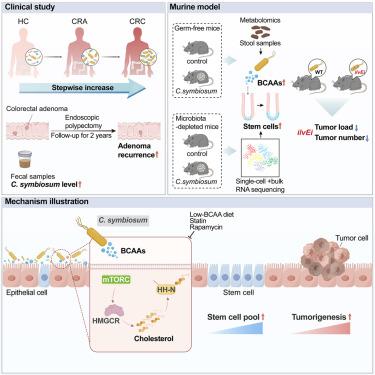当前位置:
X-MOL 学术
›
Cell Host Microbe
›
论文详情
Our official English website, www.x-mol.net, welcomes your
feedback! (Note: you will need to create a separate account there.)
BCAA-producing Clostridium symbiosum promotes colorectal tumorigenesis through the modulation of host cholesterol metabolism
Cell Host & Microbe ( IF 20.6 ) Pub Date : 2024-08-05 , DOI: 10.1016/j.chom.2024.07.012 Yi-Meng Ren 1 , Zi-Yan Zhuang 1 , Yuan-Hong Xie 1 , Peng-Jie Yang 2 , Tian-Xue Xia 1 , Yi-Le Xie 1 , Zhu-Hui Liu 1 , Zi-Ran Kang 1 , Xiao-Xu Leng 1 , Shi-Yuan Lu 1 , Lu Zhang 1 , Jin-Xian Chen 3 , Jia Xu 3 , En-Hao Zhao 3 , Zheng Wang 3 , Ming Wang 3 , Yun Cui 1 , Juan Tan 1 , Qiang Liu 4 , Wei-Hong Jiang 2 , Hua Xiong 1 , Jie Hong 1 , Ying-Xuan Chen 1 , Hao-Yan Chen 1 , Jing-Yuan Fang 1
Cell Host & Microbe ( IF 20.6 ) Pub Date : 2024-08-05 , DOI: 10.1016/j.chom.2024.07.012 Yi-Meng Ren 1 , Zi-Yan Zhuang 1 , Yuan-Hong Xie 1 , Peng-Jie Yang 2 , Tian-Xue Xia 1 , Yi-Le Xie 1 , Zhu-Hui Liu 1 , Zi-Ran Kang 1 , Xiao-Xu Leng 1 , Shi-Yuan Lu 1 , Lu Zhang 1 , Jin-Xian Chen 3 , Jia Xu 3 , En-Hao Zhao 3 , Zheng Wang 3 , Ming Wang 3 , Yun Cui 1 , Juan Tan 1 , Qiang Liu 4 , Wei-Hong Jiang 2 , Hua Xiong 1 , Jie Hong 1 , Ying-Xuan Chen 1 , Hao-Yan Chen 1 , Jing-Yuan Fang 1
Affiliation

|
Identification of potential bacterial players in colorectal tumorigenesis has been a focus of intense research. Herein, we find that Clostridium symbiosum (C. symbiosum ) is selectively enriched in tumor tissues of patients with colorectal cancer (CRC) and associated with higher colorectal adenoma recurrence after endoscopic polypectomy. The tumorigenic effect of C. symbiosum is observed in multiple murine models. Single-cell transcriptome profiling along with functional assays demonstrates that C. symbiosum promotes the proliferation of colonic stem cells and enhances cancer stemness. Mechanistically, C. symbiosum intensifies cellular cholesterol synthesis by producing branched-chain amino acids (BCAAs), which sequentially activates Sonic hedgehog signaling. Low dietary BCAA intake or blockade of cholesterol synthesis by statins could partially abrogate the C. symbiosum -induced cell proliferation in vivo and in vitro . Collectively, we reveal C. symbiosum as a bacterial driver of colorectal tumorigenesis, thus identifying a potential target in CRC prediction, prevention, and treatment.
中文翻译:

产生 BCAA 的共生梭菌通过调节宿主胆固醇代谢促进结直肠肿瘤发生
确定结直肠肿瘤发生中的潜在细菌参与者一直是深入研究的重点。在此,我们发现共生梭菌 (C. symbiosum) 选择性地富集在结直肠癌 (CRC) 患者的肿瘤组织中,并与内窥镜息肉切除术后较高的结直肠腺瘤复发相关。在多种小鼠模型中观察到共生 C. 的致瘤作用。单细胞转录组分析以及功能测定表明,共生梭 菌促进结肠干细胞的增殖并增强癌症干性。从机制上讲,共生梭 菌通过产生支链氨基酸 (BCAA) 来加强细胞胆固醇合成,支链氨基酸 (BCAA) 依次激活 Sonic hedgehog 信号传导。低膳食 BCAA 摄入量或他汀类药物阻断胆固醇合成可以部分消除共生念珠 菌诱导的体内和 体外细胞增殖 。总的来说,我们揭示了共生念珠 菌是结直肠肿瘤发生的细菌驱动因素,从而确定了 CRC 预测、预防和治疗的潜在靶点。
更新日期:2024-08-05
中文翻译:

产生 BCAA 的共生梭菌通过调节宿主胆固醇代谢促进结直肠肿瘤发生
确定结直肠肿瘤发生中的潜在细菌参与者一直是深入研究的重点。在此,我们发现共生梭菌 (C. symbiosum) 选择性地富集在结直肠癌 (CRC) 患者的肿瘤组织中,并与内窥镜息肉切除术后较高的结直肠腺瘤复发相关。在多种小鼠模型中观察到共生 C. 的致瘤作用。单细胞转录组分析以及功能测定表明,共生梭 菌促进结肠干细胞的增殖并增强癌症干性。从机制上讲,共生梭 菌通过产生支链氨基酸 (BCAA) 来加强细胞胆固醇合成,支链氨基酸 (BCAA) 依次激活 Sonic hedgehog 信号传导。低膳食 BCAA 摄入量或他汀类药物阻断胆固醇合成可以部分消除共生念珠 菌诱导的体内和 体外细胞增殖 。总的来说,我们揭示了共生念珠 菌是结直肠肿瘤发生的细菌驱动因素,从而确定了 CRC 预测、预防和治疗的潜在靶点。































 京公网安备 11010802027423号
京公网安备 11010802027423号